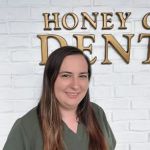How Do You Spell Dentist?
Spelling can sometimes be tricky, especially with words that have similar pronunciations but different meanings. If you’ve ever wondered about the correct way to spell "dentist," you’re not alone! I’ve heard many people, including myself at times, ask, "How do you spell dentist?" in a moment of uncertainty. It seems simple, but just like any profession, it’s important to get the spelling right. So, let’s go ahead and clear this up once and for all: the correct spelling is D-E-N-T-I-S-T.
1. Understanding the Word "Dentist"
To start, the word "dentist" comes from the French word "dentiste," which is derived from "dent," meaning "tooth." A dentist is a professional who is trained to care for teeth and gums, providing essential services such as cleanings, fillings, and much more. Now, it’s clear that the word "dentist" has a straightforward meaning—someone who looks after our dental health. But, why does this simple word sometimes cause confusion in spelling?
When I first started to focus on the correct spelling of words related to my profession (I’m a dental hygienist), I noticed that many people confuse "dentist" with similar-sounding words, like "dental" or "dentistry." These terms are connected to the field of dentistry, but each has its unique spelling and usage. It’s crucial to understand these differences to avoid errors when writing or referring to the profession.
2. Common Mistakes People Make When Spelling "Dentist"
It’s easy to make a mistake when spelling a word like "dentist," especially if you are not used to the word or if you have heard it used in different contexts. One of the most common mistakes is switching the order of the letters "i" and "e." For instance, people might write "dentist" as "dentist" or "denist." Another mistake could be overcomplicating the word by adding extra letters, such as "dentisist" or "dentistr." In fact, I've heard these variations more often than you’d think. These errors are common, but the correct spelling is simple: D-E-N-T-I-S-T.
Another mistake people sometimes make is confusing "dentist" with "dental hygienist," which is a related profession. A dental hygienist cleans teeth, takes X-rays, and educates patients about oral health, but they are not dentists. It's important to know that "dentist" refers specifically to the person responsible for diagnosing and treating dental issues.
3. How to Remember the Correct Spelling of "Dentist"
Now that you know the correct spelling of "dentist," you might be wondering, "How can I ensure I never forget it?" Here are a few simple tricks I use to remember the spelling. First, think of the word "dent" in "dentist" as a direct reference to "teeth" (since "dent" comes from the Latin word for tooth). This makes it easier to recall the connection between the word and the profession, and helps remind you that there is no "s" at the end.
Another trick I use is to break down the word into manageable parts: "Den" – "Tist." This not only helps with pronunciation but also with spelling. It’s a simple mental exercise that allows you to break down the word and focus on its individual parts. It works for me, and I’m sure it could help you too!
4. Why Correct Spelling Matters in the Dental Profession
Correct spelling is important in all fields, but in the dental profession, it holds a bit more significance. As a dental professional, using the correct spelling of terms like "dentist" ensures clear communication and builds trust with patients. For instance, when patients see official documents, advertisements, or signage that use correct spelling, they feel more confident in the professionalism of the services provided.
In my experience, patients have a greater sense of trust in a dental office that maintains a professional, polished appearance, which includes the proper use of language. Having the correct spelling on your website, business cards, and patient forms goes a long way in showing that your practice cares about the details—no matter how small.
5. How Dentists Can Educate Their Patients About Oral Health
While the spelling of "dentist" is something that everyone should know, it’s important to also educate patients about the significance of oral health. As dental professionals, we are not only tasked with treating dental conditions but also with educating our patients on prevention. Regular cleanings, checkups, and the importance of brushing and flossing regularly are essential topics that should be covered in any dental visit.
When patients come in for their appointments, it’s essential to have open conversations about the importance of maintaining oral hygiene. If you are a dentist or dental hygienist, consider explaining common terms and practices related to dental care. Help patients understand the critical role that oral health plays in their overall well-being. After all, knowing the correct spelling of "dentist" is only the beginning of a journey toward healthier teeth and gums!
6. Fun Fact: The History of Dentistry
As I delved deeper into learning about dental care, I came across a fun fact that piqued my interest. Did you know that the practice of dentistry dates back to ancient Egypt? Early dental procedures included the use of rudimentary tools for tooth extraction and dental hygiene. The profession has come a long way since then, but one thing has remained constant—the importance of teeth and the role of dentists in taking care of them!
In fact, some of the earliest references to "dentists" appeared in written texts from the 18th century, and dentistry as a formal profession continued to evolve from there. It's fascinating to think that the basic concept of dental care has existed for thousands of years, with professionals striving to improve oral health, just like today’s dentists.
Conclusion: Keeping It Simple and Professional
At the end of the day, remembering how to spell "dentist" might seem like a small thing, but it’s part of presenting yourself as a professional and competent individual in the field of dentistry. From personal experience, I can tell you that the little things—like proper spelling—make a big difference in how your patients perceive your practice. It’s a simple yet important step toward building trust and confidence in your services.
Whether you are a dentist or someone simply trying to spell the word correctly, understanding the right way to use terms in your professional life ensures that you are taken seriously. So next time you write the word "dentist," take a moment to appreciate its history and importance in both your personal and professional life!







 Emergency Dentist 24/72.0 (3 review)
Emergency Dentist 24/72.0 (3 review) Mind Your Mouth4.0 (173 review)
Mind Your Mouth4.0 (173 review) Lombardi Dentistry4.0 (358 review)
Lombardi Dentistry4.0 (358 review) Honey Creek Dental4.0 (58 review)
Honey Creek Dental4.0 (58 review) Bell Road Family Dentistry - Montgomery4.0 (240 review)
Bell Road Family Dentistry - Montgomery4.0 (240 review) The Loose Tooth Pediatric Dentistry & Aligned Orthodontics4.0 (387 review)
The Loose Tooth Pediatric Dentistry & Aligned Orthodontics4.0 (387 review) The Importance of Oral Health Education During Pregnancy for a Healthy Pregnancy
The Importance of Oral Health Education During Pregnancy for a Healthy Pregnancy Best Tips for Brushing Your Teeth Properly for Healthy Gums: Essential Techniques for Oral Health
Best Tips for Brushing Your Teeth Properly for Healthy Gums: Essential Techniques for Oral Health Why Skipping Dental Checkups Can Lead to Bigger Oral Health Problems
Why Skipping Dental Checkups Can Lead to Bigger Oral Health Problems Advantages of Porcelain Dental Restorations
Advantages of Porcelain Dental Restorations How Can Diabetes Cause Tooth and Gum Problems? Preventing and Managing Oral Health Issues
How Can Diabetes Cause Tooth and Gum Problems? Preventing and Managing Oral Health Issues Healthy Habits for Promoting Good Oral Health and Hygiene: Tips for a Healthy Smile
Healthy Habits for Promoting Good Oral Health and Hygiene: Tips for a Healthy Smile